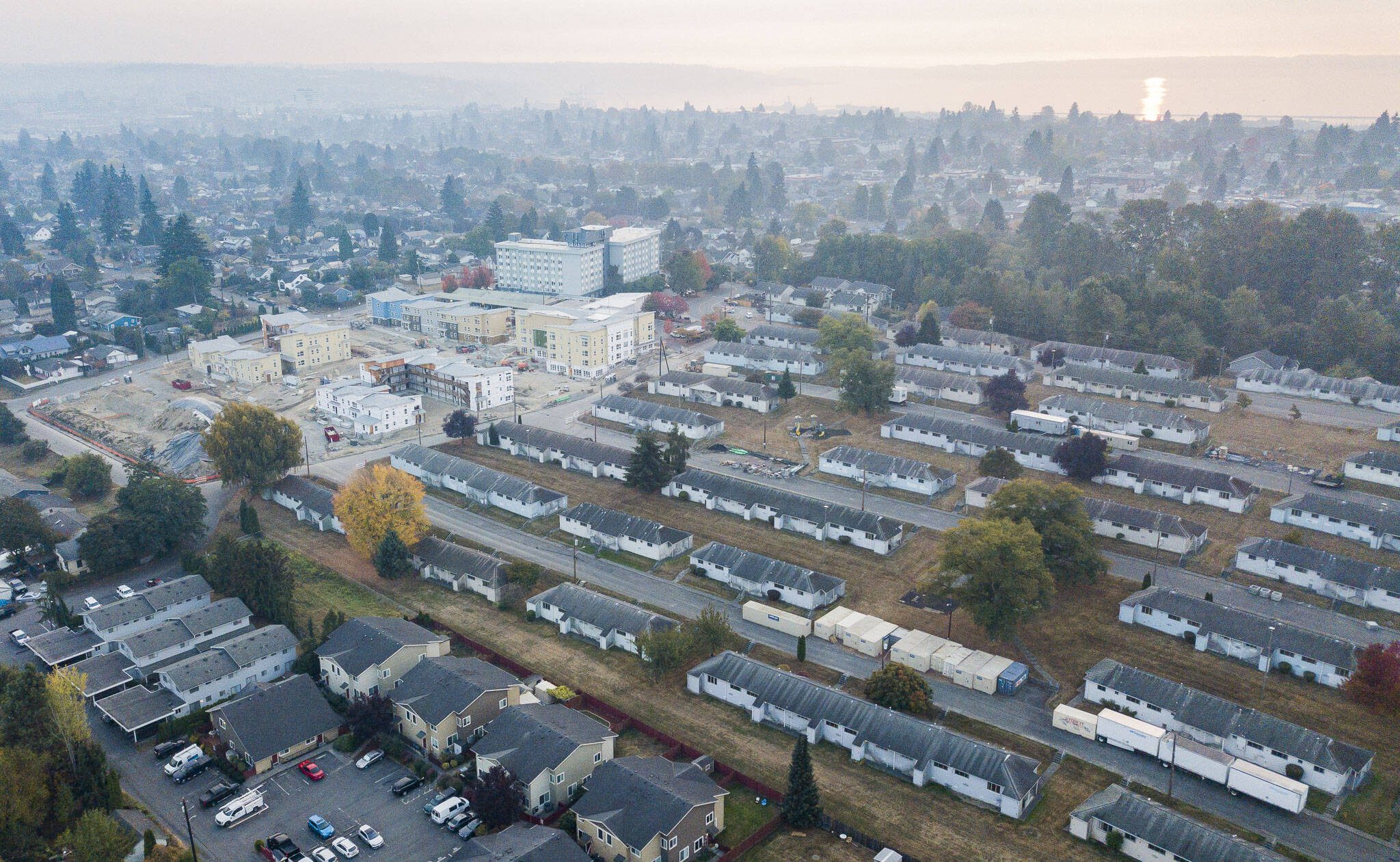EVERETT — In the Everett Housing Authority’s massive proposed development in north Everett, some buildings could reach 15 stories — as high as the tallest tower between Seattle and Canada.
In the initial master plan, published in 2022, the highest buildings in the proposed development were 12 stories.
The shift to 15 stories in recent months is part of the “multivariable puzzle” of figuring out how to make the development work, said Jason Morrow, the housing authority’s chief real estate officer. Less height for the same amount of units would mean taking up more land, Morrow pointed out. He stressed the design plan could still change in the future.
The project, known as the Park District, envisions 1,500 housing units built alongside stores and services, restaurants, offices, nonprofits and a public park.
It would all be located on the 16 acres currently occupied by the Baker Heights public housing development in Everett’s Delta neighborhood. Since 2019, that housing has been sitting empty after the housing authority shut it down due to the cost of future renovations. Some residents of Delta, a historically low-income neighborhood, have objected to the project, citing the building height and the lack of community amenities, like a youth center, gym or library.
“We cannot have high density housing without community,” the Delta Neighborhood Association wrote in a public statement last month.
As noted in a document drafted in August, the housing authority asked the city to allow buildings up to 15 stories tall at the site, among other changes to city code. The earlier plans called for four of the buildings to be high-rises, with other new apartments varying in height to “promote visual interest.”
In early February, the City Council approved a street vacation of a portion of Larch, Hemlock and Fir streets, located on the Baker Heights site, to allow for a street redesign.
On Feb. 20, the city Planning Commission hosted the first of two public hearings on the project. At the meeting, the housing authority and its consultants spent most of the time presenting an overview of the plan. A handful of people spoke, but commissioners split the hearing in two due to time.
The second part of the public hearing will be held March 5, after which the commission will vote on a recommendation for the City Council.
The first phase of construction did not require a rezone. It was completed last year. That property, called Madrona Square, has 67 units for homeless families with children enrolled in Everett Public Schools and 38 more affordable housing units.
Morrow said the housing authority is working on a partnership with the YMCA at Madrona Square. That could include youth programming, he said. The Schack Art Center is also providing art education at that location.
Those programs could be expanded in the future, he said.
Some of the other spaces mentioned in the neighborhood association’s statement “are outside the scope of what the housing authority could provide,” Morrow said.
But they are “certainly something that we understand and respect and hope that the city and other nonprofits can pitch in over the upcoming decade to provide to the neighborhood,” he said.
Parking is also a concern for some residents.
The latest plan includes a reduction in parking requirements for the Park District homes. Townhouses, for instance, have a minimum of two parking spaces per unit in Everett. In the proposal, parking spaces are instead proportional to the number of bedrooms. All units would now be required to have 0.7 spaces per bedroom.
But conditions for pedestrians in the neighborhood are poor, said Ryan Weber, chair of the Delta Neighborhood Association. Parts of 15th Street don’t have sidewalks. Accessibility ramps in the neighborhood are often very old or nonexistent, he said.
To reduce parking, “it needs to be a very well-planned transit-oriented development,” he said. “How are we encouraging people to walk, bike and take public transportation if we’re leaving areas without sidewalks?”
The recommendation is based in part on data from King County, said Marni Heffron, a transportation consultant for the housing authority. Comparable neighborhoods to Delta, with similar “proximity to transit and other services,” have an average parking rate of 0.7, Heffron explained at last week’s meeting, meaning tenants in three out of 10 units don’t own a car.
The city’s Rethink Housing Action Plan, approved by the City Council in 2021, recommended the city look into reducing parking minimums.
At last week’s meeting, commissioner Charles Adkins, also an Everett school board member, pointed to county targets aiming to increase housing in Everett by 38,557 units between 2020 and 2044.
“In pursuit of our housing goals, we do have to consider measures that are going to be uncomfortable for the neighborhoods,” Adkins said at the meeting.
At Hawthorne Elementary School in the Delta neighborhood, more than four in five students are considered low-income, state data shows. Districtwide, less than half of students are low-income.
Weber, the neighborhood association chair, also spoke at the meeting.
Overall, he supports the Park District’s plan, but “it’s not like a blank check.”
“The biggest impediment here is the city,” Weber said, citing a lack of commitment to upgrade pedestrian infrastructure and build other services in the Delta neighborhood.
“It is true that until now the private market, the city, the county have failed to invest in Delta,” he said. “Now with the housing authority, there is a partner willing to invest in providing the needs for the community.”
Have thoughts on the Park District project?
The Planning Commission will hold another public hearing 6:30 p.m. Tuesday, March 5, in City Council chambers, 3002 Wetmore Ave.
Find city documents, public comments, meeting videos and more at everettwa.gov/2941/Everett-Housing-Authority-Park-District-
Sophia Gates: 425-339-3035; sophia.gates@heraldnet.com; Twitter: @SophiaSGates.
Talk to us
> Give us your news tips.
> Send us a letter to the editor.
> More Herald contact information.

























